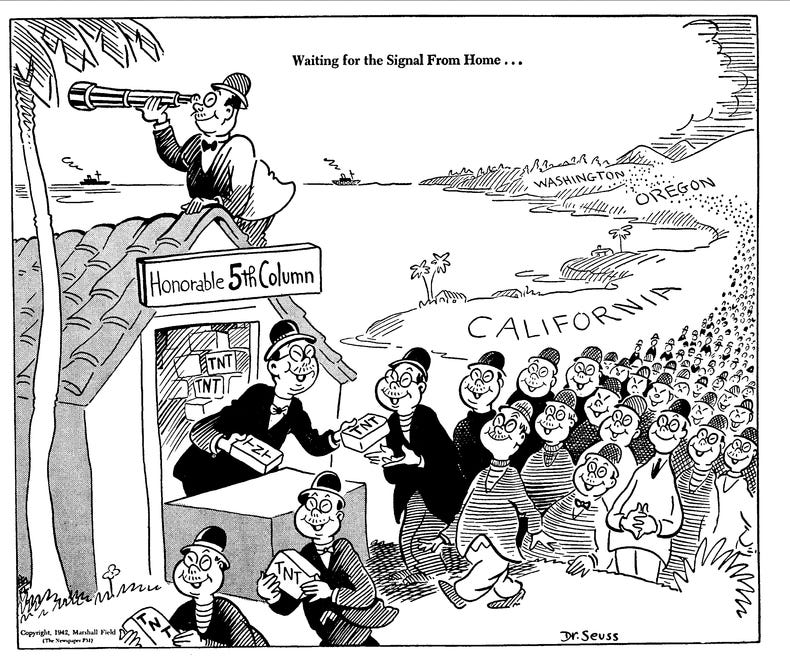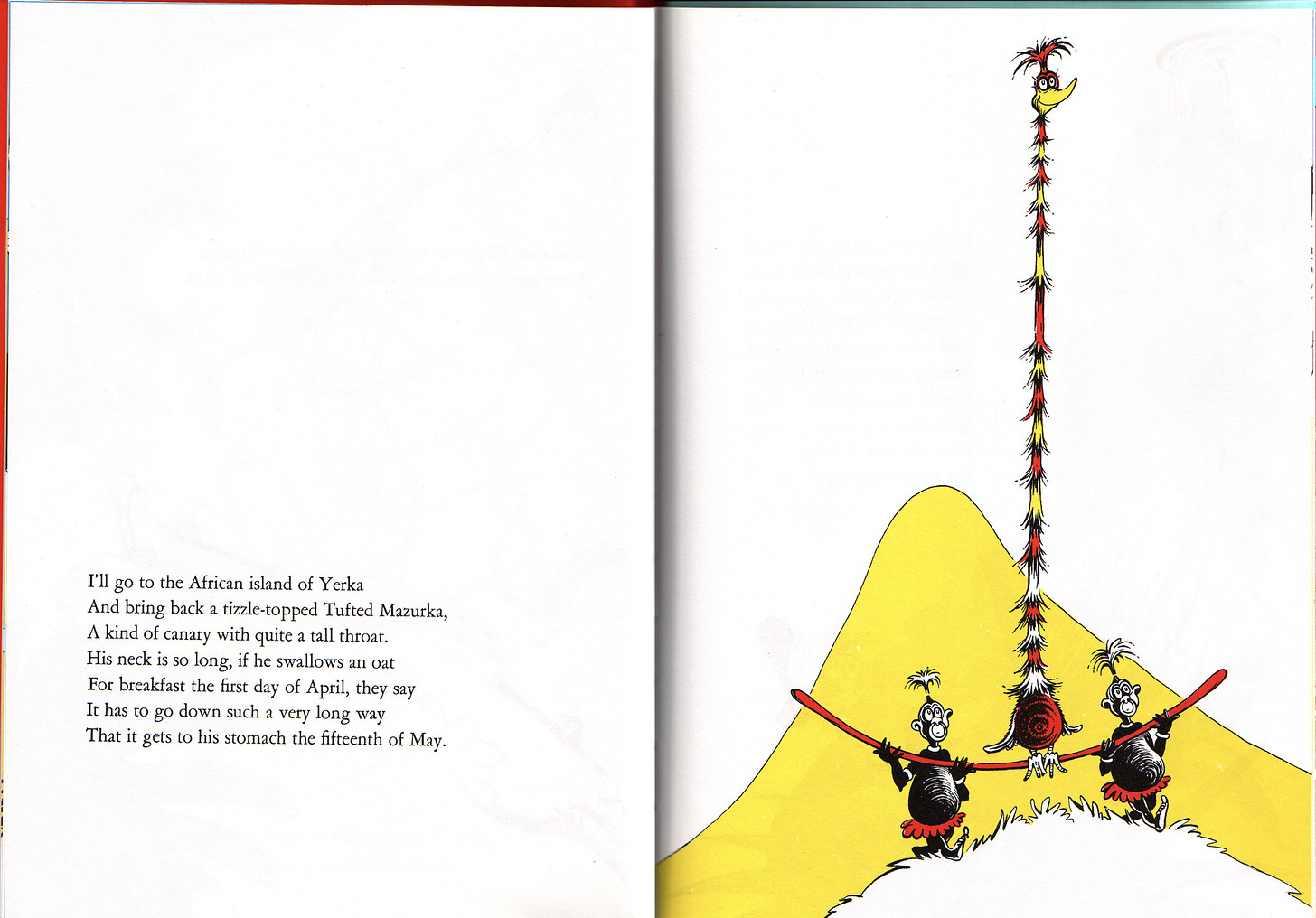Erasing Dr. Seuss
Six of the children's author's books will no longer be published due to racist imagery.
Theodor Seuss Geisel was born on March 2, 1904, in Springfield, Massachusetts. Fast forward 117 years and here we are: Dr. Seuss’s estate is ceasing publication of six of the children’s authors books due to racist imagery and racial caricatures just in time for what would have been his 117th birthday (the author died in 1991).
I’m not entirely sure how to feel about this. It’s not censorship, after all. This isn’t the result of a random mob suddenly worked up into a frenzy on Twitter. This is a decision made by the people entrusted with Dr. Seuss’s legacy after years of sober criticism of Dr. Seuss’s more problematic works. A new solution to an old problem, if you will.
The books that will no longer be published are:
Note: The above links are ‘affiliate links.’ If you purchase any of these books after following these links I’ll get a small cut, which in turn helps me run this newsletter. You can also subscribe to this newsletter!
“These books portray people in ways that are hurtful and wrong,” Dr. Seuss Enterprises told The Associated Press Tuesday.
“Ceasing sales of these books is only part of our commitment and our broader plan to ensure Dr. Seuss Enterprises’ catalog represents and supports all communities and families.”
Several of these, I admit, I’m not at all familiar with despite being raised on Dr. Seuss and similar children’s books. But the first two are famous, often considered essential pieces of Dr. Seuss’s body of work.
Dr. Seuss himself was an interesting, complicated man. He certainly penned plenty of books about the foolishness of our disputes—think “The Butter Battle Book” about the absurdity of war—and our need for tolerance of others “no matter how small” in the wonderful “Horton Hears A Who.”
But he also had a blind spot, especially when it came to the Japanese, who he lampooned over and over again in propaganda cartoons during WWII. Behold, the different way Seuss approached the visages of Hitler versus the Japanese:
He was vocally anti-Japanese during the war, even while—perhaps ironically—supporting black and Jewish rights. Nor did he have any problem with Japanese internment camps, once saying:
"But right now, when the Japs are planting their hatchets in our skulls, it seems like a hell of a time for us to smile and warble: “Brothers!” It is a rather flabby battle cry. If we want to win, we’ve got to kill Japs, whether it depresses John Haynes Holmes or not. We can get palsy-walsy afterward with those that are left.”
We can see this imagery find its way onto the pages of “If I Ran The Zoo” though he also draws pretty glaringly racist caricatures of Africans in that book as well. Note his language in this image as well, with the helpers “who all wear their eyes at a slant.”
And his Africans from the island of Yerka:
“Hurtful and wrong,” isn’t a bad way to describe these images.
Dr. Seuss, despite often championing noble causes like tolerance and peace, clearly also published some deeply problematic material. If you have a copy of “If I Ran The Zoo” you should probably talk about these images with your children rather than simply let them consume without context. On the other hand, I don’t think you should stop your kids from reading these books.
Which brings us to the real question at hand: How do we address our society’s troubling past without also pretending that past never existed? How do we deal with this stuff—because lately the answer to that question seems to be “strike it from the record” and that’s worrisome to me.
Are we right to paint over the poems of Rudyard Kipling and replace them with Maya Angelou, or does that simply prevent us from forming a more complete understanding of colonialism in favor of simply feeling better about ourselves?
Do we stop publishing problematic Dr. Seuss books, or does that ultimately only whitewash the author’s legacy without the benefit of being able to examine his less tolerant beliefs? If we can no longer read “If I Ran The Zoo” we can no longer talk to our kids about why those stereotypes are misguided and cruel.
We seem to take for granted that simply not selling these works anymore, or tearing down the bad statues, or striking long-dead white colonialist writers from the curriculum, will somehow solve something—but what does this really achieve other than sanitizing our collective past? We seem to take it for granted that reading these books also celebrates everything in them, but that’s not really how we ought to consume art to begin with.
For one thing, experiencing art isn’t simply about enjoying it. That’s not even its first function. We can also learn from art, derive meaning from art, see deeper into our own souls through art. Art makes us feel and think and moves us in ways we can’t really ever predict. It shines a light into the past and sometimes into the future.
Simply saying “This art is problematic and will now no longer be available for you” is little more than washing our hands of anything remotely troubling without actually addressing it. This goes against everything we’re supposed to believe in in a liberal society where freedom of thought is paramount. It’s cowardly and short-sighted.
Dr. Seuss was, like most of us, a multi-faceted human being with both good and bad qualities. He was a man who wrote countless books that have brought joy to kids and adults over the years, over countless generations, and many of them contain positive messages about love, acceptance and generosity.
He clearly also inked some offensive cartoons, both in his children’s books and wartime propaganda. It’s the sort of thing that might get someone “cancelled” in a heartbeat today. That should give us pause. If people are more than just racist or just sexist or just [insert bad trait/belief/affiliation here] then maybe there’s a better way forward when it comes to how we deal with them that goes beyond “end their careers, get them fired, stomp them out from polite society.”
“He who is without sin, throw the first stone,” a little-known carpenter named Jesus of Nazareth once said, as a mob geared up to stone a prostitute to death. The mob felt justified. This was a prostitute, after all. A sinner.
It’s a lesson we seem to forget over and over again, and one that comes crashing home for many who stake their social status in a culture of aggrievement and outrage on both the left and the right. The chickens come home to roost eventually, and we are none of us pure and without sin to the point that some bad thing we once said or did couldn’t find its way to the surface. Better not to posture as the arbiter of all that is just and holy only to have your skeletons come out to haunt you.
It seems to me that preserving even the more problematic bits and pieces of our history is a more honest, upfront way to deal with the past. It’s a more honest way to think about artists and writers and scientists and everyone else who came before us, as well. After all, none of these people—even the most noble-minded—share our modern mindset. They lived in different times with different social and cultural norms and values and assumptions. Someday they’ll look back on us and shake their heads. How ignorant people were back then.
We must avoid the temptation to lionize or demonize the complicated figures of the past. Better to learn from them—mistakes and achievements and all the rest.
And really, that’s the only way we can treat one another as well, those of us scrabbling about here in 2021 in the social media mud, hailing from so many different backgrounds and belief systems and economic situations, thrust into such close—yet distant—quarters with one another. Neither diabolical nor angelic, just humans, messy and imperfect, looking for love in all the wrong places.
Thanks for reading and subscribing. Let me know your thoughts in the comments or on social media!
You can find me on Twitter, Facebook, Instagram, or YouTube. Read my Forbes blog here and check out my new writing digs at Voice.










Another great article. If I can give two cents: I don't believe that what the Seuss estate is doing is right. They're basically doing what Disney does with movies like Song of the South: Pretend that it never happened. And that's wrong. Warner Bros whenever they released classic cartoons on DVD, they always had a disclaimer stating that while the stereotypes and racist imagery were wrong then and are still wrong today, they decided NOT to edit them and released them in their original state because pretending that they never happened is just as wrong and that we should learn from those mistakes. More companies need to learn this.
First off, another great article. I look at this from a different vantage point. It is important to remember that messages contained in this type of art are not mere words in a book or movies on a screen. The messages go along with an era where basic human rights were being denied on the basis of race. The messages and symbolism helped perpetuate this denial of basic human rights. Often, someone will say that we need to understand the historical context or era in which these books were published as a way to excuse the author and continue to “enjoy” these works of art. However, that is a one-sided view of history. The victims that were denied their basic human rights knew that the messages were discriminatory and racist. However, they had no voice to protest. To say that these books were accepted back in the day is a false statement. They were accepted by a majority white population that had the power to discriminate against racial and ethnic minorities. They were not accepted by the racial and ethnic minorities. What was wrong back then is wrong today. The Seuss estate is right to stop publishing those books just as Disney is right to stop showing Song of the South.